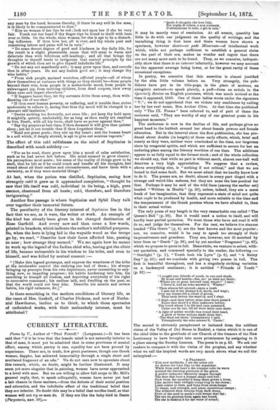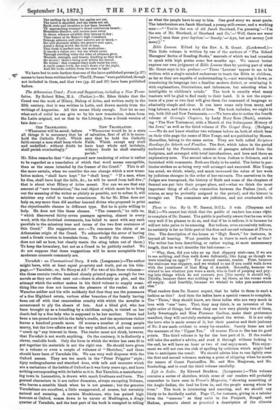CURRENT LITERATURE.
Poems by V., Author of "Paul Ferrell." (Longmans.)—It has been said that "if it be trite that the female mind is not naturally inferior to that of man, it must yet be admitted that in some provinces of mental effort, among which poetry is one, equality has not been proved by experience. There are, in truth, few great poetesses, though one Greek woman, Sappho, has achieved immortality through a single short and mutilated fragment of an ode." We do not care now to speculate about this remark, which, no doubt, might be further illustrated. It may seem yet more singular that in painting, women have never approached to a level with men. But we are willing to allow full scope to Mr. Mill's general reply, that, to speak colloquially, women have never yet had a fair chance in these matters,—from the defects of their social position and education, and the indefinite effect of the traditional belief that they are inferior. No doubt this may be a belief that verifies itself, so that women will not by as men do. If they are like the baby-bird in Dante (Purgatorio, xxv. 10),—
"Quale 11 cicognin che leve l'ala.
Per voglia di volare, e non s'attentit D'abbandonar lo nido, e gib la cats,"
it may be merely want of resolution. At all events, quantity has little to do with our judgment on the quality of writings, and the tantalising thing is that here and there women have shown a specimen, however short—ex pede lifinervani —of intellectual work which, while not perhaps sufficient to establish a general claim on the part of their sex, makes us wonder and regret that there are not many more such to be found. They, as we conceive, indisput- ably show that there is no inherent inferiority, however we may account for the apparent average being lower, or for the great rarity of these occasional exceptions.
In poetry, we conceive that this assertion is almost justified by the slim little volume before us. Very strangely, the pub- lishers have put in its title-page, in the place of mottoes, an eulogistic extract—to speak plainly, a puff—from an article in the Quarterly Review on English poetesses, which was much noticed at the time it appeared, 1840. One of these ladies wrote under the signature " V." ; we do not apprehend that we violate any confidence by calling her by her real name, Mrs. Archer Clive. At that time she published only "The IX. Poems" here referred to, and of part of these the reviewer said, "They are worthy of any of our greatest poets in his happiest moments."
The authoress is now in the decline of life, and perhaps gives no great heed to the hubbub around her about female powers and female education. But in the interval since the first publication, she has pro- duced about double (in length) of those early efforts, which, brief and scanty as they were, neither were overlooked at the time, nor forgotten since by congenial spirits, and which are sufficient to secure for her an enduring place among the literary worthies of our time. The additions appear to us fully equal to the former stock ; and of the whole collection we should say, that while no part is without merit, almost one-half well deserves a very high appreciation. We suppose that a review, above everything else, is "nothing if not critical," and that we are bound to find some fault. But we must admit that we hardly know how to do it. The poems are, no doubt, almost in every part tinged with a strange and weird-like sadness, but they are none the less poetical for that. Perhaps it may be said of the wild lines (among the earlier set) headed "Written in Health" (p. 20), unless, indeed, they are a mere freak of her imagination, that they represent a state of mind not quite what ought to be produced by health, and more suitable to the time and the temperament of the Greek poetess whom we have alluded to, than to their actual writer.
The only poem of any length is the very remarkable one called "The Queen's Ball" (p. 26). But it would need a notice to itself, and will hardly bear partial quotation. We trust those who have not read it will do so, and judge for themselves. For the rest, we believe the stanzas headed "The Grave" (p. 4) are the best known and the most popular ; nor, we conceive, would it be easy to speak too strongly of their impressiveness and grandeur. They are, however, not ill matched by later lines on 'Death" (p. 39), and by yet another "Fragment" (p. 42), which we propose to quote in full. Meanwhile, we venture to select, with- out quotation, and commend specially to the reader, the following :— " Starlight " (p. 1), "Youth took his Lyre" (p. 8), and "A Rainy Day" (p. 55); and we conclude with giving two poems in full. The first is beautiful throughout, and has a singularly striking variation on a hackneyed sentiment; it is entitled "Friends of Youth" (p. 22) :—
"I sought you, friends or youth, in sun and shade, By home and hearth—but, no! ye were not there; 'Where are ye gone, beloved ones, where?' I said; I listedd, and an echo answeed, Where ? '
"Then silence fell around—upon a tomb
I sate me down dismay'd at death, and wept; Over my senses fell a cloud of gloom,
They sank before the myst'ry, and I slept, "I slept—and then before mine eyes there press'd Faces that show'd a bliss unknown before; The loved whom I in life had once possess'd, Came one by one, till all were there once more.
"A light of nobler worlds was round their head, A glow of better actions made them fair; 'The dead are there,' triumphantly I said, Triumphantly the echo answer'd, ' There!'
The second is obviously paraphrased or imitated from the sublime vision of the Valley of Dry Bones in Ezekiel, a vision which it is one of the chief titles to the gratitude of our Church of the framers of the New Lectionary to have brought into more promipence by assigning to it a place among the Sunday Lessons. The poem is on p. 42. We ask our readers to compare it with the vision of the prophet, and say whether what we call the inspired words are very much above what we call the uninspired:— "A. FRAGMENT.
"E'en now methinks, I see the ashes stir As dawns the Last Day en the sepulchre.
While from mid heav'n the trumpet rolls its wave Around the bursting precincts of the grave.
A. power unknown obscurely ranges through The dust that bore a human shape and hue; Slow from the moulder'd heap there grows a form, Like morn's faint twilight conqu'ring in the storm; Limb comes to limb, and bone from atom-heaps To shape, and strength, and place, mysterious creeps ; The withered flesh returns from dark decay, Fruit of the seed in earth's cold breast that lay ; The eye its glorious form again has found, The ear Is fashion'd for the voice of sound;
The smiling lip is there, but smiles not yet, The hand is Moulded, and the limbs are set. Earth reels and trembles to her base. beneath Th' approaching trumpet's dread continuous breath ; Mountains dissolve, and oceans pass away In chaos, whence erewhile they sprang to-day ; Time ceases at its Maker's high command. Strange spheres and other natures are at baud,— But still proceeds within the grave's rent span, Amid a dying world, the birth of man. That form is perfect now, but motionless; It stands a statue yet; but see where press Through swelling veins the tides of crimson glow, Warmth, strength, and beauty, kindling as they flow. He moves! there's being now within his breast, Be wakes ! that trumpet-blast bath burst his rest; A smile comes forth, the soul's dawn o'er the night, And life looks sudden from the eyes in light."
'We have but to note further that one of the later-published poems (p.37) seems to have been written before "The IX. Poems "were published, though not included in them, and that two (pp. 45 and 59) have been published before.



































 Previous page
Previous page